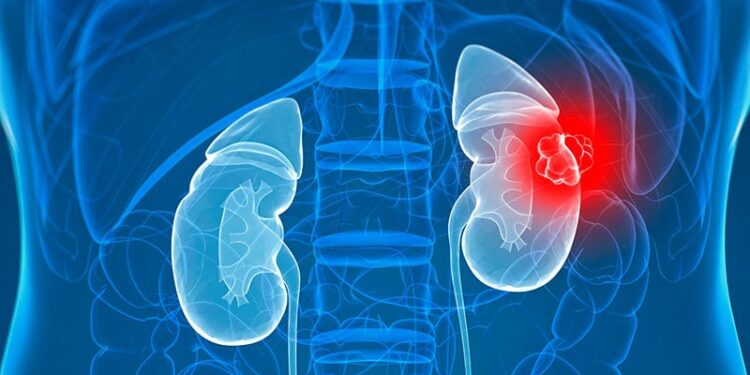TOPLINE:
A higher body mass index (BMI) across all ages as well as significant weight gain during adulthood were associated with a greater risk for renal cell carcinoma, while a BMI reduction of 10% or more in adulthood, especially after age 50 years, was associated with a lower risk for renal carcinoma, a new study showed.
METHODOLOGY:
- Excess body adiposity in midlife is a known risk factor for renal cell carcinoma; however, the association between lifetime body weight patterns and different subtypes of renal carcinoma remains largely unexplored.
- Researchers included 204,364 participants from the National Institutes of Health–American Association of Retired Persons Diet and Health Study and evaluated lifetime body weight patterns using BMI measured at age 18, 35, and 50 years and at baseline (age, 51-71 years).
- The BMI trajectory across adulthood was calculated using a trajectory model that helped make a heterogeneous population into a more homogeneous one, and weighted years living with overweight or obesity were calculated by measuring excess BMI at different ages.
- Participants were categorized as underweight (BMI, < 18.5), normal weight (BMI, 18.5-24.9), overweight (BMI, 25-29.9), or obese (BMI, ≥ 30). The median follow-up period was 19 years.
- Study outcomes were risks for overall renal cell carcinoma (n = 1425), aggressive renal cell carcinoma (n = 583), fatal renal cell carcinoma (n = 339), and histologic subtypes, including clear cell renal cell carcinoma (n = 541), papillary renal cell carcinoma (n = 146), and chromophobe renal cell carcinoma (n = 64).
TAKEAWAY:
- A higher BMI at any age was associated with an increased risk for renal cell carcinoma overall and all subtypes (hazard ratios [HRs], 1.10-1.40 per five-unit increase from baseline BMI), aside from chromophobe renal cell carcinoma.
- An increase in the number of years living with overweight or obesity was associated with elevated risks for overall renal cell carcinoma (HR, 1.17), clear cell renal cell carcinoma (HR, 1.21), aggressive renal cell carcinoma (HR, 1.21), and fatal renal cell carcinoma (HR, 1.16), but not papillary (HR, 1.13; 95% CI, 0.97-1.32) or chromophobe renal cell carcinoma (HR, 0.92; 95% CI, 0.68-1.25).
- Compared with those who were never overweight, individuals who became overweight at some point, especially those whose BMI values first exceed 25 at age 18 (HR, 1.68) or 35 years (HR, 1.74), had an elevated risk for renal cell carcinoma.
- A BMI reduction of 10% or more between ages 18-35 years and after age 50 was associated with a 21% (HR, 0.79) and 28% (HR, 0.72) lower risk for overall renal cell carcinoma, respectively.
IN PRACTICE:
“Future studies should evaluate whether primary intervention programs for weight reduction in obese individuals confer protective effects to reduce renal cell carcinoma risk,” the authors wrote.
SOURCE:
The study was led by Zhengyi Deng, PhD, MBBS, Stanford University School of Medicine in Palo Alto, California, and was published online in Cancer.
LIMITATIONS:
BMI does not differentiate between fat and muscle mass. Lifetime weight data were based on self-reported BMI at four time points, potentially missing fluctuations. The study population, predominantly comprising White individuals and those aged > 50 years, may limit generalizability.
DISCLOSURES:
The study did not receive any specific funding. Two authors reported receiving travel and/or consulting fees from various sources.
This article was created using several editorial tools, including AI, as part of the process. Human editors reviewed this content before publication.
Source link : https://www.medscape.com/viewarticle/how-lifetime-weight-patterns-influence-kidney-cancer-risk-2025a10007gv?src=rss
Author :
Publish date : 2025-03-28 11:40:00
Copyright for syndicated content belongs to the linked Source.














